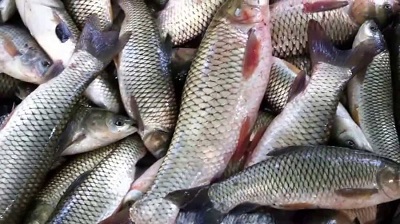
Milk revenue supports Neudamm research

Barbara Visagie is in charge of the separator that skims the cream from the milk. The cream is then used to produce butter. (Photograph by Hilma Hashange)

Jafta Ngavetene at the pasteurisation machine. (Photograph by Hilma Hashange)
The Neudamm Agricultural College was owned by the Ministry of Agriculture, Water and Forestry until 2008 at which point it was transferred to the University of Namibia and managed by the Faculty of Agriculture and Natural Resources. The farm is located on 1200 hectares of arid rangeland with beef and dairy cattle, goats, sheep a few pigs and a thousand egg-laying chickens from South Africa.
The dairy farm, situated about 30 kilometres east of Windhoek on the main road to Hosea Kutako International Airport, operates dairy processing units, including a pasteurising machine which allows further processing of value-added products such as pasteurised milk, table cream and butter. Other downstream products come from fermented milk such as cheese, yoghurt and cultured milk (Omaere).
Pasteurisation destroys most harmful bacteria which leads to the quick fermentation of unpasteurised milk. Sterilisation of the uncured milk can be partial or complete. From the cow, the milk is transferred manually into a filler, put into containers and is pasteurized at 80o Celsius before transferred to a cooler and stored in a cold room after which it is labeled.
The dairy employs seven employees in different functions in milk production, in the abattoir as well as in the poultry house. Apart from producing its own dairy products, all the branding and packaging of products is done on the farm. “We produce according to demands and because dairy products expire fast, the products are priced at affordable prices compared to other dairy products,” said supervisor of the farm, Jefta Ngavetene.
The dairy products generate an income especially for the Neudamm community who has to travel a fair distance to get to the city. The Neudam staff and students and the UNAM staff at the main campus also enjoy the benefit of fresh dairy products at subsidised prices. According to Ngavetene, products from the farm are not sold commercially but only at Neudamm and at the university’s main campus in Windhoek. “We sell the dairies to recover the costs incurred during production but our products are no different from other dairy products,” Ngavetene elaborated.
According to him, a litre of fresh and cultured milk sells for N$7.50, cream goes for N$20 and a 250 ml of yoghurt is sold for N$ 4.00 while the 500ml is sold at N$12.00. Ngaveteve says no cases of contamination as a result of consuming products from the farm have ever been reported, however a few customers complained about the milk’s shelf life before the pasteurisation process was introduced.
The farm sells 800 litres of milk per week to caterers at the university’s main campus which amounts to N$30,000 per month and sells about 4000 litres of milk on a daily basis directly to both students and staff.
The dairy farm also keeps a battery of laying hens. Ngavetene said egg production has increased dramatically since Neudam received 1000 hens from South Africa in July 2012. On average each hen lays one egg a day, tallying up to 1000 eggs collected everyday at the coup. He said soon another chicken house will be built as more chickens are expected to arrive.
In 2009, the dairy started with only 8 cows and the number has since increased to 26. “Production was slow at the beginning but it is now improving. The demand of the dairy products especially the milk will increase when the farm becomes fully operational with at least 30 cows which will represent 600 litres of milk being produced per day,” Ngavetene added.
Namibia imports processed milk from South Africa, Europe and South America such as Parmalat, Clover, Supermilk and Hom’Sek. The only significant local producer of fresh and processed dairy is Namibia Dairies.
Ngavetene is of the opinion that the university should expand the farm’s production to different farming facilities in the surrounding areas in order for other farmers to gain some experience in the different production sectors. “There is a need to expand especially to the rural areas where farmers will gain some knowledge and skills on how to produce dairy products and emulate what we do here at Neudam.”











































